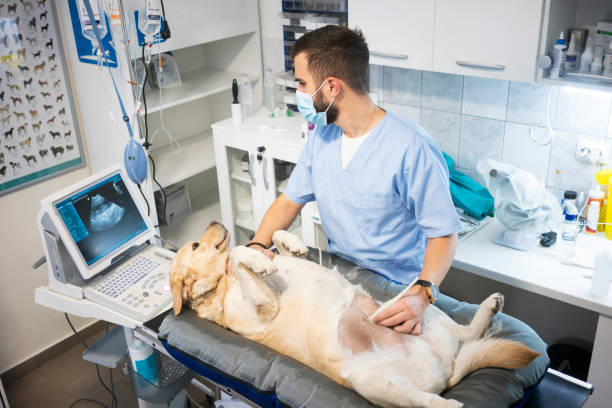Table of Contents:
- Introduction
- What is Parvovirus?
- How Do Dogs Contract Parvovirus?
- Direct contact with infected dogs
- Indirect contact with contaminated objects
- Contaminated human hands or clothing
- Ingestion of infected feces
- Symptoms of Parvovirus in Dogs
- Diagnosing Parvovirus
- Treating Parvovirus
- Preventing Parvovirus
- Vaccination
- Isolation and Quarantine
- Hygiene
- Conclusion

Parvovirus is a highly contagious and potentially deadly disease that affects dogs, particularly puppies and unvaccinated dogs. Understanding the causes, symptoms, prevention, and treatment of parvovirus is crucial for every dog owner. In this comprehensive guide, we’ll delve into the world of parvo and equip you with the knowledge to protect your furry companion.
What is Parvovirus?
Parvovirus, commonly known as parvo, is a viral infection caused by the canine parvovirus type 2 (CPV-2). This virus primarily targets rapidly dividing cells in a dog’s body, leading to severe gastrointestinal issues and a weakened immune system. The virus can remain stable in the environment for long periods, making it highly contagious and easy to transmit.
How Do Dogs Contract Parvovirus?
Parvovirus spreads through direct and indirect contact with infected dogs or their feces. Dogs can contract the virus by:
- Direct contact with infected dogs: Sniffing, licking, or coming into close contact with infected dogs can transfer the virus from one dog to another.
- Indirect contact with contaminated objects: Parvovirus can survive on various surfaces and objects. Dogs can get infected if they come into contact with contaminated food bowls, toys, bedding, or the ground in areas where infected dogs have been.
- Contaminated human hands or clothing: Humans can inadvertently carry the virus on their hands or clothing after handling an infected dog or contaminated objects. If they interact with susceptible dogs without proper hygiene, they can transmit the virus.
- Ingestion of infected feces: Dogs can contract parvovirus by ingesting the virus present in the feces of infected dogs.
Symptoms of Parvovirus in Dogs
Identifying the early symptoms of parvovirus is crucial for prompt treatment. The virus primarily affects the gastrointestinal tract and can lead to the following symptoms:
- Severe vomiting
- Profuse diarrhea, often bloody
- Loss of appetite
- Lethargy and weakness
- Dehydration
- Fever
Diagnosing Parvovirus
If you notice any of the symptoms mentioned above in your dog, it’s essential to seek immediate veterinary attention. Diagnosing parvovirus involves a thorough physical examination, blood tests, and sometimes, additional diagnostic procedures like fecal tests.
Treating Parvovirus
Unfortunately, there is no specific cure for parvovirus. The treatment primarily focuses on supporting the dog’s immune system and managing the symptoms. Hospitalization is often necessary to provide intravenous fluids, antibiotics to prevent secondary infections, and medications to control vomiting and diarrhea.
Preventing Parvovirus
Prevention is the key to safeguarding your dog from parvovirus. Here are some essential steps to follow:
- Vaccination: Ensure your dog is up-to-date with their vaccinations, starting from puppyhood and continuing with regular booster shots.
- Isolation and Quarantine: If you suspect that your dog has parvovirus, isolate them from other dogs immediately and follow your vet’s quarantine recommendations.
- Hygiene: Practice good hygiene by regularly cleaning and disinfecting your dog’s living area and belongings. Avoid contact with sick or unknown dogs.
Conclusion
Parvovirus is a serious threat to dogs, but with proper knowledge and preventive measures, it is possible to protect our beloved pets from this devastating disease. Regular vaccinations, good hygiene practices, and early veterinary intervention are essential steps to ensure your dog’s safety. Always be vigilant and seek immediate veterinary attention if you suspect your dog may have contracted parvovirus.
Frequently Asked Questions
- What is parvovirus, and how does it affect dogs?
- Parvovirus is a highly contagious viral infection that primarily affects the gastrointestinal tract of dogs, causing severe vomiting, diarrhea (often bloody), loss of appetite, weakness, and dehydration. It can be particularly dangerous for puppies and unvaccinated dogs.
- How do dogs contract parvovirus?
- Dogs can contract parvovirus through direct contact with infected dogs or their feces, indirect contact with contaminated objects, contaminated human hands or clothing, and ingestion of infected feces.
- Is parvovirus treatable in dogs?
- There is no specific cure for parvovirus, but with prompt and appropriate veterinary care, it can be managed. Treatment mainly involves supportive care, such as intravenous fluids to combat dehydration, antibiotics to prevent secondary infections, and medications to control vomiting and diarrhea.
- What are the early symptoms of parvovirus in dogs?
- Early symptoms of parvovirus in dogs include severe vomiting, profuse diarrhea (often bloody), loss of appetite, lethargy, weakness, and fever.
- Can I vaccinate my dog against parvovirus, and when should I do it?
- Yes, vaccinating your dog against parvovirus is crucial for prevention. Puppies should start their vaccinations at around 6-8 weeks of age, with subsequent shots every 3-4 weeks until they are around 16 weeks old. Adult dogs should receive regular booster shots to maintain immunity
- How can I prevent my dog from contracting parvovirus?
- To prevent parvovirus, follow these steps: ensure your dog is up-to-date with vaccinations, avoid contact with infected or unknown dogs, practice good hygiene by regularly cleaning and disinfecting your dog’s living area, and promptly seek veterinary attention if you suspect your dog may have been exposed to the virus.
- Can humans get infected with parvovirus from dogs?
- No, parvovirus is specific to dogs and cannot infect humans. However, humans can inadvertently carry the virus on their hands or clothing, leading to transmission to other dogs. It is essential to practice good hygiene to avoid potential transmission.
- Is parvovirus fatal for dogs?
- Parvovirus can be fatal, especially in young puppies and dogs with compromised immune systems. However, with prompt and appropriate treatment, the chances of survival significantly improve.
- How long does parvovirus survive in the environment?
- Parvovirus can survive in the environment for several months, making it essential to clean and disinfect areas where infected dogs have been to prevent transmission to other dogs.
- Can dogs get parvovirus more than once?
- Dogs that have recovered from parvovirus generally develop immunity to future infections. However, it is crucial to continue with regular vaccinations to maintain long-term protection.
